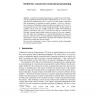Free Online Productivity Tools
i2Speak
i2Symbol
i2OCR
iTex2Img
iWeb2Print
iWeb2Shot
i2Type
iPdf2Split
iPdf2Merge
i2Bopomofo
i2Arabic
i2Style
i2Image
i2PDF
iLatex2Rtf
Sci2ools
POPL
1990
ACM
1990
ACM
Concurrent Constraint Programming
Abstract. Concurrent constraint programming is a simple but powerful framework for computation based on four basic computational ideas: concurrency (multiple agents are simultaneously active), communication (they interact via the monotonic accumulation of constraints on shared variables), coordination (the presence or absence of information can guard evolution of an agent), and localization (each agent has access to only a finite, though dynamically varying, number of variables, and can create new variables on the fly). Unlike other foundational models of concurrency such as CCS, CSP, Petri nets and the -calculus, such flexibility is already made available within the context of determinate computation. This allows the development of a rich and tractable theory of concurrent processes within the context of which additional computational notion such as indeterminacy, reactivity, instantaneous interrupts and continuous (dense-time) autonomous evolution have been developed. We survey t...
Basic Computational Ideas | Concurrent Constraint Programming | POPL 1990 | Programming Languages | Shared Variables |
Related Content
| Added | 28 Aug 2010 |
| Updated | 28 Aug 2010 |
| Type | Conference |
| Year | 1990 |
| Where | POPL |
| Authors | Vijay A. Saraswat, Martin C. Rinard |
Comments (0)

